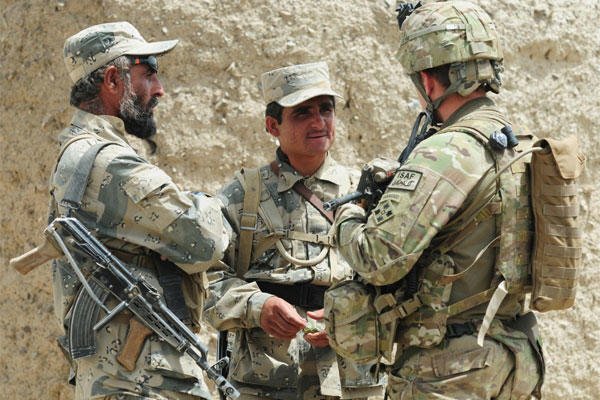At least seven of the 88 prisoners Afghanistan may soon release are believed by the U.S. coalition commander to be responsible for "insider attacks" that killed U.S. and NATO troops, U.S. military officials said Tuesday.
A number of the 88 are prime suspects in the insider, or "green on blue," incidents in which Afghans wearing army or police uniforms have attacked and killed U.S. and coalition troops. said Col. Dave Lapan, a spokesman for Marine Gen. Joseph Dunford, commander of the International Security Assistance Force. The insider attacks sapped support for the war and prompting several allies to withdraw their forces,
"[At least] seven of the 88 fall into that category," Lapan said in an e-mail from ISAF headquarters in Kabul. A Pentagon spokesman also confirmed that insider attack suspects were among the 88, but declined to give a number.
In a visit to Kabul last week, Sens. John McCain, R-Ariz., Lindsey Graham, R-S.C., and John Barrasso, R-Wyo., warned President Hamid Karzai that the planned prisoner release threatened to scuttle talks on a new Bilateral Security Agreement to allow U.S. and allied troops to remain in Afghanistan past 2014.
"We don't want to see what happened in Iraq, where we won the war but lost the peace," McCain said. Graham said "These people have blood on their hands. If the release goes ahead it will cause irreparable damage to our relationship."
The 88 were among more than 3,000 prisoners the U.S. turned over to Afghan jurisdiction last year with pledges from the Afghans that their cases would be processed through the Afghan justice system.
Following U.S. complaints, Karzai ordered Afghan intelligence officials to provide an Afghan review board considering the releases with more background on the cases.
The head of the review board, Abdul Shakor Dadras, said Monday that he was still determined to go ahead with the release, despite warnings that the detainees would quickly return to the battlefield.
"The documents we have seen so far provide no reason to convict them," Dadras told Reuters. "Our decisionis to release them as soon as possible, if there is no incriminating evidence against them."
The insider attacks have been a major factor in the rapid decline of the American public's support for the longest war in U.S. history.
Last week, a CNN/ORC poll showed that 17 percent of Americans nationwide supported the war while 82% were opposed.
Insider attacks peaked in 2012, when ISAF recorded 46 separate insider attacks that killed a total of 62 coalition troops, compared to 21 attacks in 2011 that killed 35.
In 2013, there were 16 deaths coalition deaths in 10 separate insider attacks. Marine Gen. Joseph Osterman, ISAF director of operations, gave credit for the decline to the Afghan National Security Forces.
"They put in much more robust screening processes, education processes, and at the local level, just awareness of soldiers who were potential 'green-on-blue' perpetrators," Osterman said.sol
During the height of the insider threat in 2012, ISAF briefly suspended all activities with ANSF forces and later instituted a "guardian angel" program in which an armed and ready coalition soldier was to be present whenever coalition troops mingled with ANSF forces.
ISAF commanders acknowledged that it had become increasingly difficult to explain and justify their mission to wary publics back home, and especially to the families of the victims.
"The problem with the insider attacks is that they strike at the heart of our resolve," said Australian Brig. Gen. Robert Noble, then the ISAF deputy chief of staff, in a 2012 briefing to the Pentagon from Kabul.
Back in the U.S., the families of victims of the insider attacks find it difficult to comprehend that "you've been shot by those you came to help," Noble said.
Noble's comments in 2012 came after the grieving father of a Marine shot to death by an Afghan wearing a police uniform said that his son was threatened earlier by an Afghan army officer and feared for his life.
Lance Cpl. Gregory T. Buckley wrote of the threat and his concerns in a four-page letter home shortly before he was killed on Aug. 10 in the Sangin district of Afghanistan's southwestern Helmand province.
"My son said 'Daddy, I'm scared,'" said Greg Buckley Sr. "I didn't tell my wife or my boys but he said 'Dad I'm scared. I don't want to be here no more. Something could happen to me," WCBS-TV in New York City reported.
Buckley, 21, of Oceanside, N.Y., on Long Island, Staff Sgt. Scott E. Dickinson, 29, of San Diego, Calif., and Cpl. Richard A. Rivera Jr., 20, of Ventura, Calif., were killed when an Afghan police officer carrying an AK-47 rifle walked into a Marine gym and opened fire.
"Get the rest of those boys out of there," Buckley's father said. "He had only four months left on his tour. There's no purpose for us being there."
Then-French President Nicolas Sarkozy expressed similar sentiments in 2012 in ordering all French forces to withdraw ahead of the U.S. plan for the withdrawal of all coalition combat forces in 2014.
"The French army is in Afghanistan at the service of the Afghans against terrorism and against the Taliban," Sarkozy said at the time. "The French army is not in Afghanistan so that Afghan soldiers can shoot at them."




























